Table of Contents
Get started with MyPerfectResume today!
- Build a resume on any device
- Pick an ATS-friendly template
- Tailor with AI copy suggestions
Why this resume works
- Quantifies accomplishments: Measurable accomplishments, like a 20% crime reduction and 15 arrests, highlight the applicant’s tangible impact and value.
- Highlights industry-specific skills: With skills such as crime scene investigation, defensive tactics, and surveillance, the applicant demonstrates expertise tailored perfectly to law enforcement and security roles.
- Illustrates problem-solving ability: By implementing a patrolling protocol that reduced response time by 30%, the applicant showcases innovative problem-solving skills rooted in efficiency and public safety.
More Law Enforcement Resume Examples
See our law enforcement resume examples to learn how to highlight your investigative skills, community engagement, and ability to maintain public safety. These samples will help you craft a strong, compelling resume.
Police Officer Resume
Why this resume works
- Centers on academic background: Earning a master’s degree in criminal justice underlines the strong academic foundation early in this applicant’s career.
- Effective use of keywords: Incorporating keywords like crime reduction, emergency management, and community policing optimizes the resume for ATS filters.
- Shows digital literacy: By managing security protocols and improving response times, the applicant showcases digital readiness through essential computer skills relevant to modern safety roles.
Criminal Investigator Resume
Why this resume works
- Points to measurable outcomes: By achieving an 85% case closure rate and recovering over $250,000 in fraud losses, the applicant showcases strong contributions through measurable results across diverse investigative roles.
- Demonstrates language abilities: Language skills in Spanish, French, and German improve cross-cultural communication and broaden opportunities for international collaboration.
- Displays technical expertise: Certifications like Certified Criminal Investigator and Forensic Certification emphasize specialized expertise essential for complex investigations, reinforcing the applicant’s commitment to technical mastery in their field.
Police Detective Resume
Why this resume works
- Focuses on work history: By organizing extensive career experiences in a chronological resume, the applicant effectively highlights their growth and sustained impact over time in law enforcement roles.
- Lists relevant certifications: With valuable certifications like Advanced Detective Skills, the applicant emphasizes their dedication to developing expertise and staying updated within their field.
- Showcases impressive accomplishments: Achievements such as solving 80% of cases yearly showcase leadership and tangible contributions to public safety.
Explore Even More Law Enforcement Resumes
Law Enforcement Resume Template (Text Version)
Hiro Park
Silverlake, WA 98292
(555)555-5555
Hiro.Park@example.com
Professional Summary
Dedicated law enforcement officer with 6+ years of experience. Proficient in crime scene investigation, community policing, and emergency response. Proven track record of reducing crime rates and ensuring public safety.
Skills
- Crime Scene Investigation
- Community Policing
- Emergency Response
- Defensive Tactics
- Report Writing
- Conflict Resolution
- Surveillance
- Public Safety
Certifications
- Certified Protection Officer – International Foundation for Protection Officers
- Law Enforcement Certification – California POST
Education
Master of Arts Criminal Justice
University of California, Los Angeles Los Angeles, California
June 2017
Bachelor of Science Criminal Justice
California State University, Long Beach Long Beach, California
June 2015
Work History
Law Enforcement Officer
Los Angeles Police Department – Silverlake, WA
March 2023 – August 2025
- Patrolled assigned areas, reducing crime by 20%
- Responded to emergency calls ensuring public safety
- Conducted investigations leading to 15 arrests
Security Specialist
SecureWatch Inc. – Eastside, WA
March 2020 – February 2023
- Monitored surveillance systems, reducing theft by 15%
- Trained new hires on security protocols
- Conducted risk assessments for 10+ sites
Corrections Officer
Riverside Correctional Facility – Eastside, WA
March 2018 – February 2020
- Maintained facility security and inmate order
- Escorted inmates during transfers with 0 incidents
- Conducted 50+ inmate searches uncovering contraband
Languages
- Spanish – Beginner (A1)
- French – Intermediate (B1)
- German – Beginner (A1)
Browse Resume Examples by Industry
- Aviation
- Banking
- Billing And Collections
- Biology
- Boating
- Business Operations
- Casino
- Chemistry
- Child Care
- Civil Engineering
- Compliance
- Computer Hardware
- Computer Software
- Construction
- Copywriting
- Cosmetology
- Costco
- Culinary
- Customer Service
- Dance
- Data Systems Administration
- Deloitte
- Dentistry
- Driving
- Education
- Electrical
- Electrical Engineering
- Energy
- Engineering
- Entertainment
- Entrepreneur
- Entry Level
- Environmental
- Environmental Science
- Event Planning
- Executive
- Fashion
- Film
- Finance
- Fitness And Nutrition
- Food Service
- Freelancing
- General Laborer
- Goldman Sachs
- Government
- Graphic Design
- Healthcare Support
- Hospitality
- Human Resources
- HVAC
- Industrial Engineering
- Information Technology
- Insurance
- Interior Design
- Inventory Management
- Janitorial
- Landscaping
- Language Services
- Law
- Library
- Logistics
- Maintenance
- Marketing
- McKinsey
- Mechanical Engineering
- Mechanics
- Media And Communication
- Medical
- Mental Health
- Meta
- Metal Work
- Military
- Mining
- Museum
- Music
- Netflix
- Non Profit
- Nursing
- Pharmaceutical
- Photography
- Physical Therapy
- Plumbing
- Politics
- Production
- Program Manager
- Project Manager
- Psychology
- Purchasing
- Quality Control
- Real Estate
- Religion
- Retail
- Safety And Security
- Sales
- Sciences
- Shipping
- Social Services
- Special Education
- Sports
- Statistics
- Student
- Teaching
- Team Lead
- Tesla
- Training And Development
- Transportation
- Travel
- Veterinary
- Walgreens
- Walmart
- Web Development
Advice for Writing Your Law Enforcement Resume
Discover tips on how to write a resume that highlights your unique skills and experiences in this field. Whether you’re aiming for a position as a police officer, detective, or any other law enforcement role, our advice will help you create a standout resume that captures the attention of hiring managers. Learn how to effectively present your qualifications for an exciting career in serving and protecting your community.
Write a strong professional summary
A professional summary on a resume serves as an introduction to hiring managers, offering a snapshot of your skills and experience. Deciding whether to use a summary or an objective depends on your career stage and goals. For law enforcement roles, this section can quickly highlight your ability to maintain public safety and enforce laws effectively.
A professional summary is typically three to four sentences that showcase your experience, skills, and achievements. It’s ideal for experienced applicants who want to demonstrate their professional identity and value in the field of law enforcement. This concise overview helps you stand out by showing what you’ve accomplished in previous roles.
In contrast, a resume objective focuses more on career goals, making it suitable for entry-level applicants, career changers, or those with employment gaps. While a summary addresses “what I’ve accomplished,” an objective highlights “what I aim to contribute.”
Next, we’ll explore examples of both summaries and objectives tailored for various industries and experience levels, helping you craft the perfect introduction for your résumé in law enforcement or other fields. See our library of resume examples for additional inspiration.
Law enforcement resume summary examples
Entry-level
Criminal justice graduate with a focus on law enforcement and public safety. Completed internship with the city police department, gaining foundational skills in patrol operations and community policing. Certified in CPR and first aid, with a strong understanding of criminal law fundamentals and evidence handling. Eager to contribute to maintaining public order and safety.
Mid-career
Law enforcement officer with over six years of experience in urban policing, specializing in traffic enforcement and crime prevention. Proven track record in conducting investigations, responding to emergencies, and collaborating with local agencies to reduce crime rates. Holder of an advanced certification in tactical response, known for effective communication and conflict resolution skills.
Experienced
Seasoned law enforcement professional with 15+ years of service, including leadership roles such as sergeant in charge of training new recruits. Extensive background in narcotics investigation and task force coordination. Led successful operations resulting in significant drug seizures and arrests. Committed to fostering community relationships while upholding high standards of justice and integrity.
Law enforcement resume objective examples
Entry-level
Dedicated and responsible recent criminal justice graduate seeking an entry-level position in law enforcement. Aims to leverage educational background and strong communication skills to serve the community effectively while gaining hands-on experience in public safety.
Career changer
Motivated individual transitioning from a security services role into law enforcement, eager to apply conflict resolution and critical thinking skills within a police department. Committed to maintaining public safety and building trust with community members through proactive policing.
Entry-level
Aspiring law enforcement officer with a keen interest in forensic science and investigative techniques, looking to start a career with a forward-thinking police department. Passionate about contributing to crime prevention efforts and supporting justice through detail-oriented investigations.
Make your police officer resume stand out! Use our AI Resume Builder to organize your skills and experience quickly, so you can focus on catching the bad guys.
Include relevant certifications and training
Listing certifications and training is important in law enforcement because it shows your skills and readiness for the job. These credentials prove you have specialized knowledge or skills needed to handle complex situations safely. By creating a dedicated certifications section, your qualifications stand out to employers. This can be an enhancement alongside your education section. Here are a few examples:
- Peace Officer Standards and Training (POST) Certification
- CPR and First Aid Certification
- Taser Certification
- Firearms Skill Certificate
- Crisis Intervention Training (CIT)
Having these certifications can help you succeed in law enforcement by showing you are prepared for the challenges of the job. They also indicate that you are committed to continuous learning and professional development. Make sure to keep this section updated as you earn new certifications.
Example of a certifications section
Certified Law Enforcement Analyst
Issued by: International Association of Crime Analysts (IACA)
Issued 2022
Crisis Negotiation Certification
Issued by: Federal Bureau of Investigation (FBI)
Expires 2025
Crime Scene Investigator Certification
Issued by: International Association for Identification (IAI)
Issued 2023
Advanced Law Enforcement Rapid Response Training
Issued by: ALERRT Center at Texas State University
Issued 2021
First Aid and CPR Certification
Issued by: American Red Cross
Expires 2024
Choose a polished and well-organized resume template that effectively showcases your skills and qualifications to stand out to hiring managers in your field.
Showcase your work experience
Showcasing your work experience on a resume is essential, particularly in law enforcement roles. It allows potential employers to see the skills and results you’ve achieved in past positions. Begin with your most recent job and work backwards when listing your work experience. This reverse chronological format makes it easier for employers to track how your career has progressed.
For each job, be sure to include details like your job title, employer name, location, and dates of employment. Describe your duties and accomplishments using clear, action-oriented language.
Focus on measurable results such as reducing crime rates or improving community relations. Highlight core responsibilities relevant to law enforcement, like patrolling areas, investigating crimes, making arrests, writing reports, and collaborating with the community.
Providing specific examples of what you’ve accomplished can significantly impact how employers view you. Mentioning achievements like leading a team or solving major cases clearly demonstrates your capabilities. Whenever possible, quantify these achievements—saying something like “decreased neighborhood thefts by 20%”—to provide concrete evidence of your impact.
This approach helps employers understand not only what you did but also how effectively you performed your duties and the positive outcomes resulting from your work.
5 law enforcement work history bullet points
- Collaborated with a 10-member team to execute over 50 high-risk operations annually, leading to a 20% decrease in the local crime rate.
- Developed and implemented community outreach programs, increasing neighborhood watch participation by 40%.
- Investigated and solved over 200 cases per year, maintaining a conviction rate of 85%.
- Trained and mentored recruits on patrol procedures and safety protocols, improving team performance by 30%.
- Used advanced forensic technology to analyze evidence, resulting in a 25% improvement in case resolution times.
Highlighting leadership, problem-solving, and teamwork using the right resume format can help law enforcement job seekers stand out.
Match your resume with the job description
Tailoring resumes to job descriptions is essential for job seekers, especially in fields like law enforcement. This approach helps you stand out to employers and ensures your resume passes through applicant tracking systems (ATS), which scan resumes for specific keywords from job postings.
An ATS-friendly resume includes keywords that match the job description. By aligning these words with your skills, you increase the chance of catching the hiring manager’s attention, making it more likely you’ll be considered for the role.
To achieve this, it’s important to customize your resume so it aligns closely with what each employer is looking for. To find keywords, carefully read the job posting. Look for repeated skills, qualifications, and duties such as “community policing,” “criminal investigations,” or “emergency response.”
Incorporate these terms naturally into your resume. For example, instead of saying “Handled community issues,” you can write “Managed community policing efforts to resolve local concerns.” This not only highlights your experience but also demonstrates direct relevance to the job requirements listed by employers.
Targeted resumes improve ATS compatibility by effectively matching your abilities with what employers are seeking. This tailored approach boosts your chances of progressing in the application process and landing an interview.
Try our ATS Resume Checker to scan for over 30 common mistakes in your resume’s format and content. Get quick tips on boosting your resume score.
FAQ
Do I need to include a cover letter with my law enforcement resume?
Yes, including a cover letter with your law enforcement resume can improve your application and increase your chances of getting noticed.
A cover letter provides an opportunity to express your dedication to public safety and highlight specific skills or experiences that make you a strong applicant for the role.
For instance, if you’re applying to a department known for community policing, you can discuss relevant experiences that align with their focus.
Consider using our Cover Letter Generator to craft a compelling cover letter that complements your resume and emphasizes key qualifications effectively.
Additionally, reviewing cover letter examples can offer valuable insights into structuring and tailoring your letter to fit the law enforcement field.
How long should a law enforcement resume be?
For a law enforcement role, a one-page resume is often ideal, especially if you’re early in your career or transitioning from another field. This format lets you focus on key qualifications like physical training, conflict resolution skills, and knowledge of law enforcement protocols without overwhelming the reader.
If you have extensive experience, specialized certifications, or leadership roles within law enforcement, consider using a two-page resume. Ensure every detail supports your application and highlights achievements relevant to the position you’re pursuing.
To determine the best approach for your situation, explore our guide on how long a resume should be, which offers practical advice tailored to different career stages and industries.
How do you write a law enforcement resume with no experience?
When crafting a resume with no experience for law enforcement, highlight your strengths, education, and any skills relevant to the role. This approach can help you stand out despite lacking direct experience. Here are a few tips to help you get started:
- Emphasize education: Start by listing your degree in criminal justice or related fields. Mention coursework, projects, or honors that are relevant to law enforcement.
- Highlight applicable skills: Even without direct experience, you can showcase transferable skills like communication, problem-solving, attention to detail, and teamwork. These are important for law enforcement roles.
- Include volunteer work or internships: If you’ve volunteered in community service or interned with local police departments, include these experiences to demonstrate your commitment and understanding of the field.
- List certifications: Any certifications, such as CPR, first aid, or defensive driving, should be prominently listed as they add value to your application.
See our guide on writing a resume with no experience for tips and examples on how to effectively present yourself in a law enforcement resume with no experience.
Rate this article
Law Enforcement
Share this page
Additional Resources
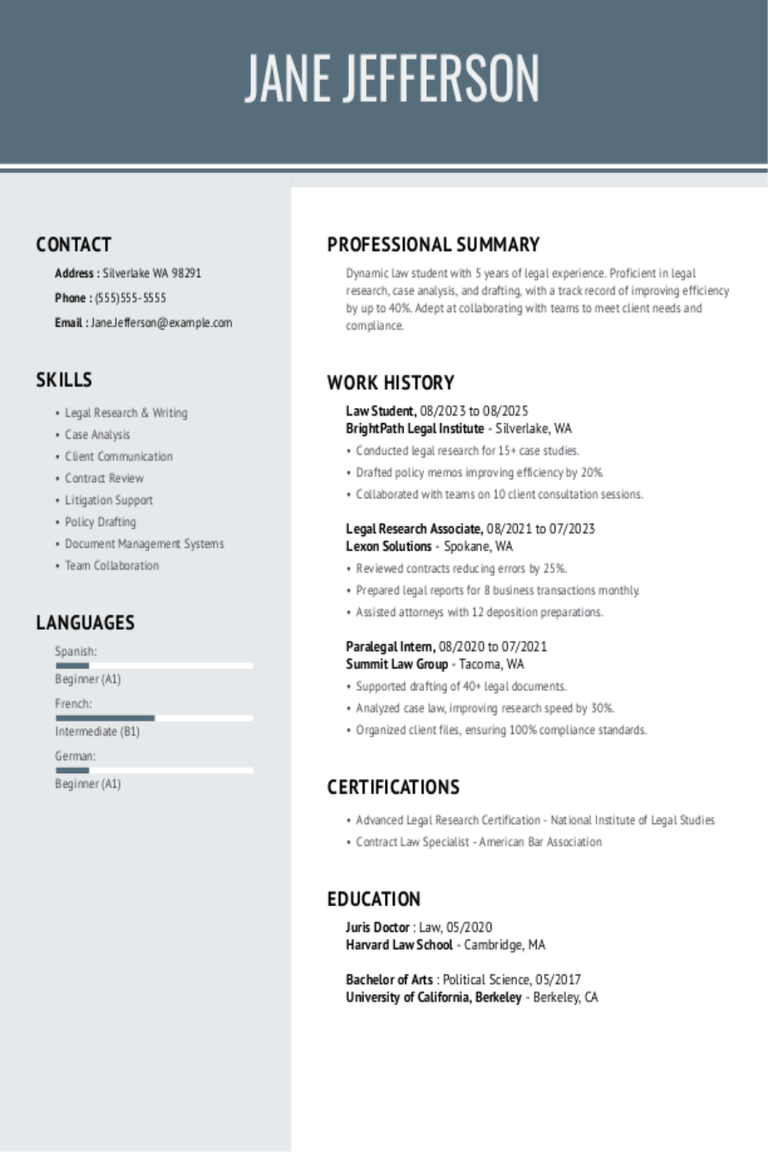
Law Student Resume Examples & Templates
See how law students showcase their research skills and legal knowledge in these resume examples. Use them as a guide to highlight your experience, internships, and passion for justice in
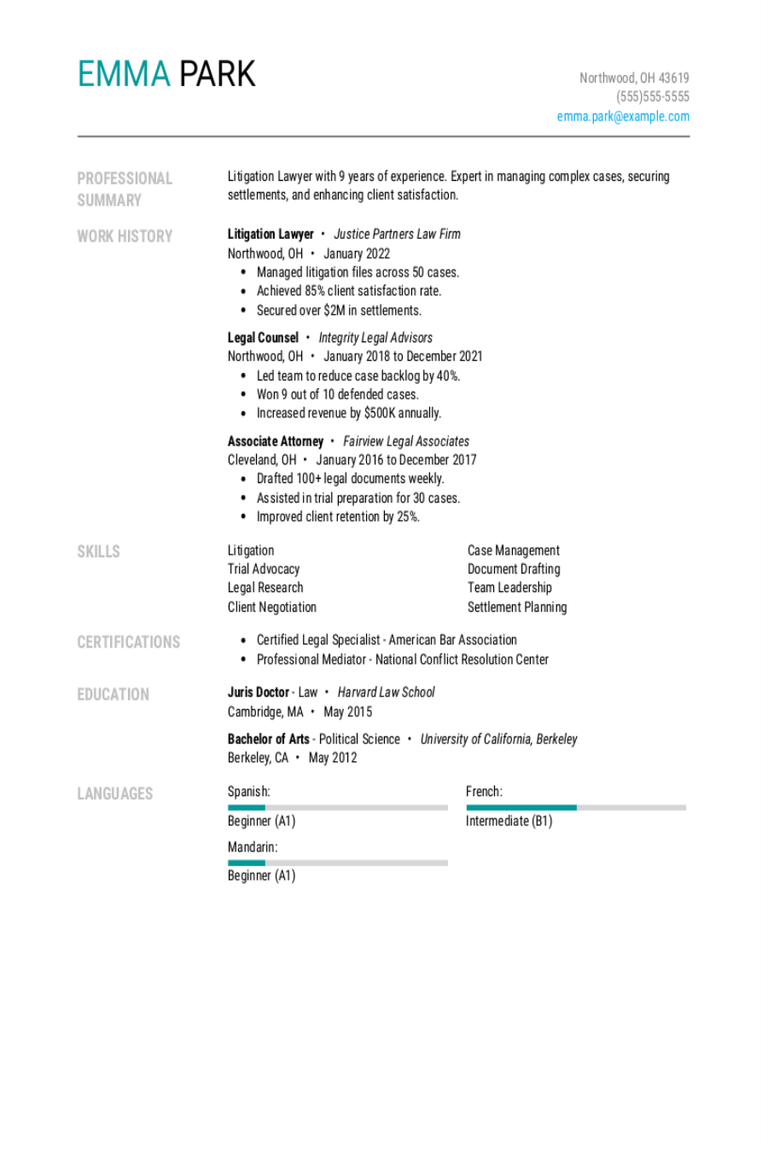
Litigation Lawyer Resume Examples & Templates
Browse litigation lawyer resume examples and tips to help you write about your legal research, negotiation experience, and success with client advocacy.Build my resumeImport existing resumeCustomize this templateWhy this resume
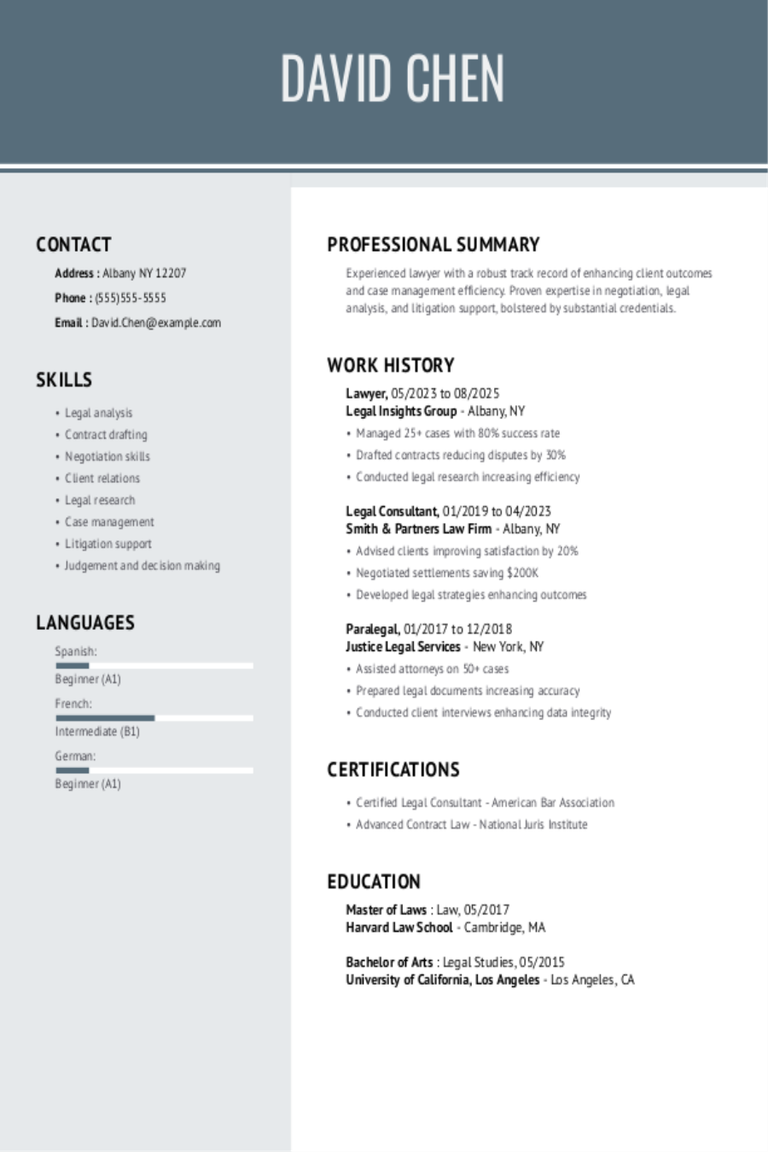
Lawyer Resume Examples & Templates
Check out these lawyer resume examples to learn how attorneys showcase winning cases and client negotiations. These samples and tips can help you build a resume that highlights key skills
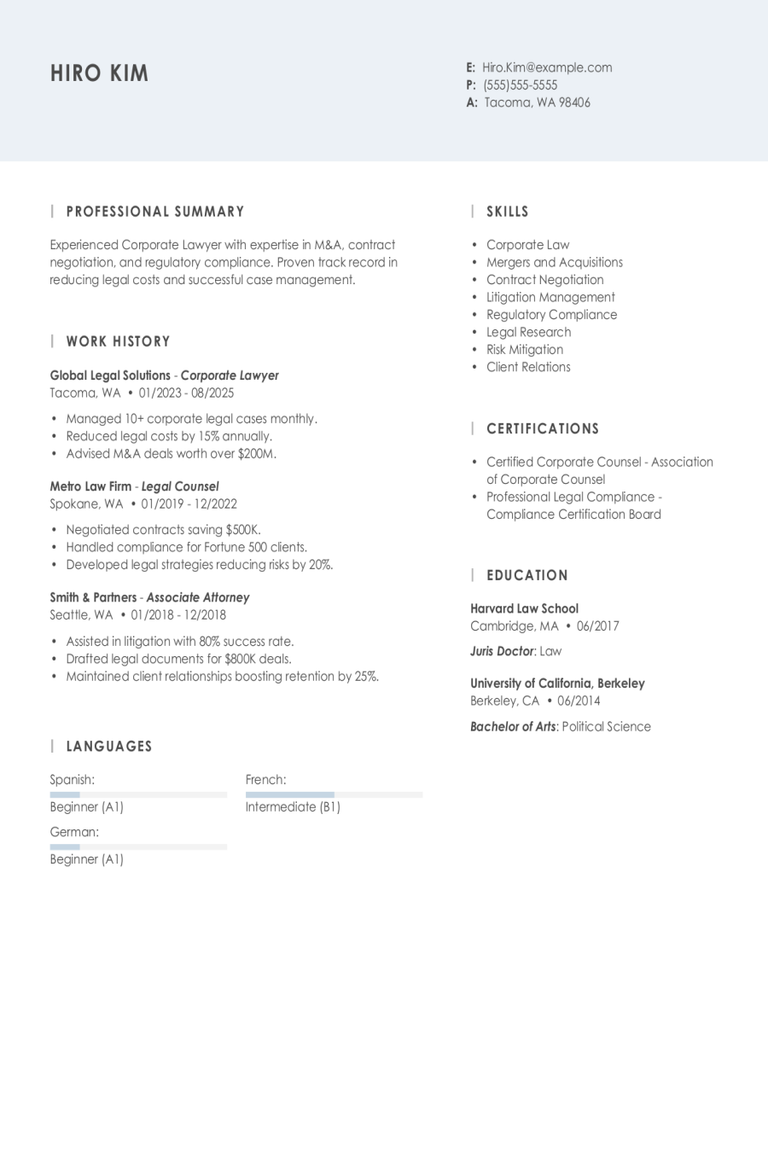
Corporate Lawyer Resume Examples & Templates
Discover corporate lawyer resume examples and find out how to showcase your negotiation skills and legal experience to attract top employers.Build my resumeImport existing resumeCustomize this templateWhy this resume worksQuantifies
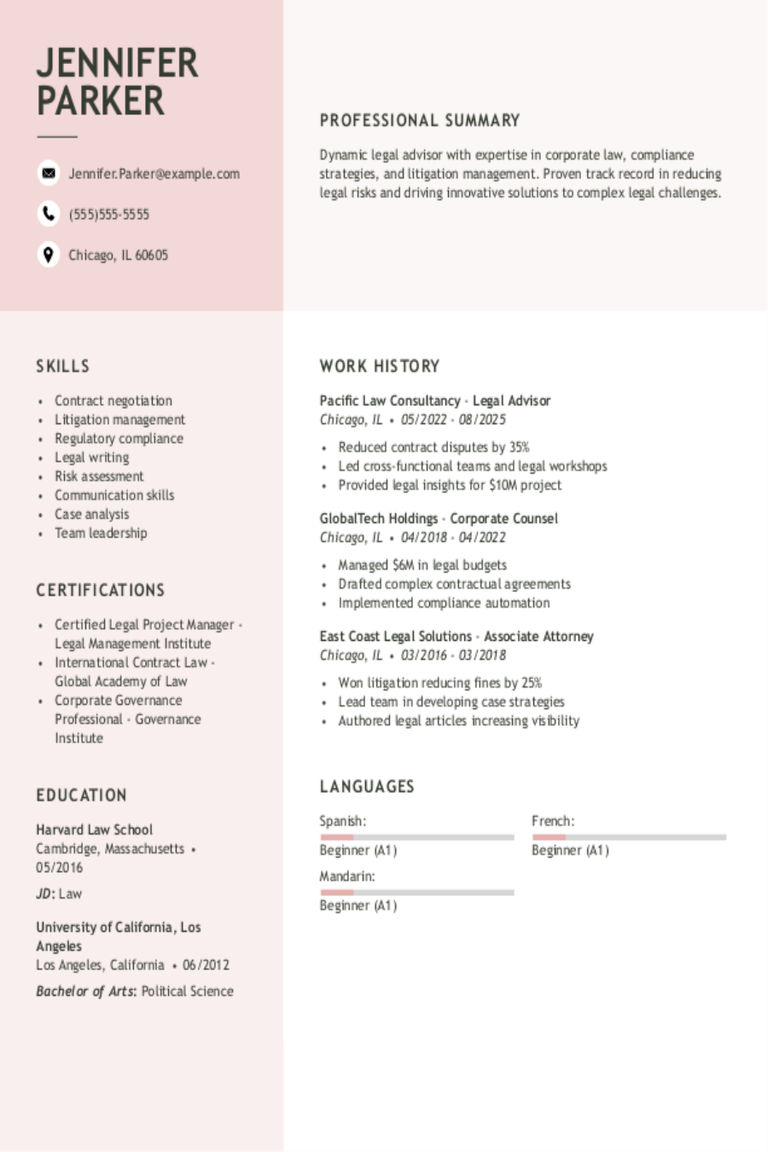
Law Resume Examples & Templates
Discover law resume examples that showcase your expertise in research, client relations, and courtroom procedures. Learn how to highlight your legal skills and experience to impress hiring managers and land

10 Job Search Tips & Strategies for 2026
Searching for a job can be both exciting and overwhelming—especially in a competitive market where hiring moves fast and expectations are high. Whether you’re entering the workforce, returning after time away,
